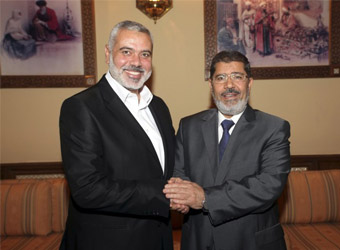When Egypt’s army toppled the Muslim Brotherhood from power last week, it also delivered a punishing blow to Hamas in Gaza.
Fallen President Mohamed Morsi was one of the last remaining friends of Hamas after the group broke from the Iranian “Axis of Resistance” last year. Unable to stand by while the Iran-backed Syrian regime mowed down tens of thousands of fellow Muslims in Syria, Hamas left its Damascus headquarters. As punishment for this defection, Iran cut the purse strings.
Predictably, Hamas turned to Morsi’s Egypt, along with Qatar and Turkey, for patronage. This Muslim Brotherhood triumvirate, for the last year, provided financial assistance to the terrorist organization that conquered the Gaza Strip by force in 2007, while also working assiduously to bring it out of political isolation. These three countries represented a tripod upon which Hamas, a group that is heavily dependent upon foreign assistance to survive, was tenuously balanced.
After Morsi’s ejection last week, Gaza-based leader Ismail Haniyeh stated that he was “not afraid.” If he isn’t, he should be. Now, Hamas has only two patrons left, and both are Western allies that could be tempted to throw Hamas under the bus for greater financial or political incentives. Meanwhile, the Egyptian Army has stepped up efforts to block Hamas’ financial lifeline, the underground smuggling tunnels connecting Egypt’s Sinai Peninsula to Gaza, while the Rafah Border crossing – the only overland exit for the Hamas-controlled territory – has remained largely closed since Morsi’s dramatic demise.
Admittedly, everything wasn’t rosy between Hamas and Egypt during Morsi’s short stint in office either. Hamas has taken a beating in the Egyptian press. Most of the criticism stemmed from concern over violence in the Sinai Peninsula carried out by Gaza-based Salafi jihadist groups. Last year, for example, Gaza-based fighters attacked an Egyptian military outpost near Rafah and killed 16Egyptian soldiers. There was further concern in Cairo that Hamas members might be sneaking in via the tunnels to carry out operations in Egypt. Egypt’s military subsequently closed down dozens of smuggling tunnels, while also interdicting weapons transfers to the Palestinian territory, including short-range rockets and antitank missiles.
Yet all the while, Morsi continued to provide political support to Hamas, hosting at least one senior Hamas figure – Mousa Abu Marzouk – on Egyptian soil. Egypt hosted Hamas’s internal elections earlier this year. It was widely believed that Muslim Brotherhood financiers found ways to bankroll their brothers in Gaza under the table, so as to not upset Egypt’s patrons in the U.S. Congress.
As one Israeli official put it, Egypt was Hamas’s “back office.” The Brotherhood played a particularly crucial role in ensuring the bulk-cash smuggling that has kept Gaza’s economy running.
In other words, under Morsi, the Egyptian government was at odds with itself. Conspiratorial minds might even link the Hamas issue to last week’s toppling, but the country’s Gaza policy was not even a peripheral reason for the military’s intervention.
For Hamas now, the problem is less about the Egyptian army’s wrath or the rapid unraveling of Morsi, and more about the overall beating that the Muslim Brotherhood brand just took. In Egypt, there is no easy way forward. The movement can either swallow its defeat and retreat to its former role of Islamic opposition, or launch an “intifada” against the state. These are tough choices for the “mother ship” of the Muslim Brotherhood, which sets the tone for the other regional movements, including Hamas.
Hamas’ adversaries understand this. Israel’s public security minister Yitzhak Aharonovitch recently suggested that the Islamist faction was weaker. Palestine Liberation Organization official Yasser Abed Rabbo also called upon Hamas to rethink its position in the region. “The victory of the revolution in Egypt and the fall of the Muslim Brotherhood warrants [such] reflection,” he told Palestinian state radio, adding, “Hamas must realize that the Brotherhood can no longer protect it.”
The PLO, of course, lacks the means to topple Hamas, and the Israelis are not likely to strike at Hamas given the multitude of other military threats on their plate (Iran nukes and Syrian WMD are chief among them).
For the moment, then, Hamas is probably safe. It still appears to have the backing of Qatar and Turkey. Nevertheless, the divorce from Iran and Syria, followed by the collapse of the Muslim Brotherhood in Egypt, give the impression that Hamas has buckled at the knees. Whether it is allowed to stand again may depend upon the new junta in Cairo.
About the Writer:
Jonathan Schanzer, a former terrorism finance analyst at the U.S. Department of the Treasury, is vice president for research at the Foundation for Defense of Democracies. The views expressed are his own.
Jonathan Schanzer has worked as a counterterrorism analyst for the Office of Intelligence and Analysis at the U.S. Department of the Treasury. Prior to that, he was a Research Fellow at the Washington Institute for Near East Policy. Mr. Schanzer got his start in the policy world as a research fellow at the Middle East Forum, a Philadelphia-based think tank headed by scholar Daniel Pipes. His publications have received numerous professional reviews and have produced various discussions.
Source: CNN


